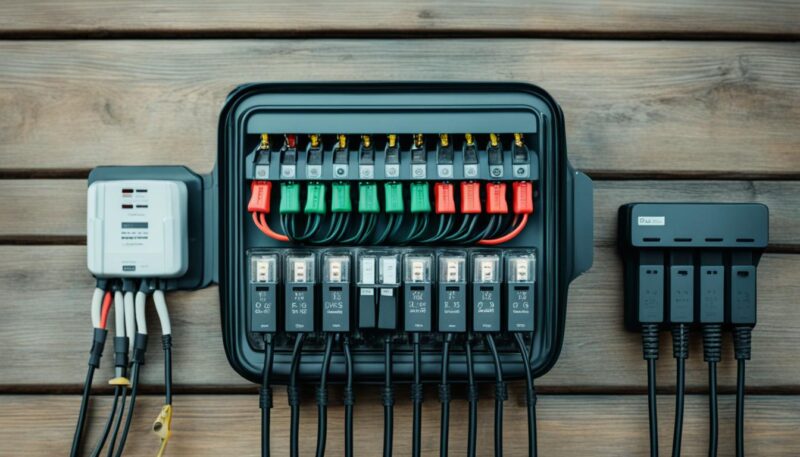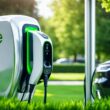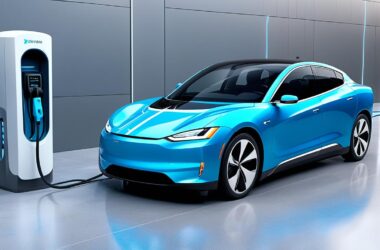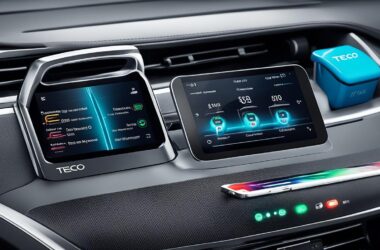If you’re considering making the switch to an electric vehicle (EV) or already own one, upgrading your fuse box is a crucial step to ensure your home is compatible with EV charging. With the increasing popularity of electric vehicles and the push for sustainable transportation in the UK, it’s essential to have a fuse box that can support the energy demands of EV charging.
By upgrading your fuse box, you can enhance your home’s EV charging capabilities and contribute to the growth of EV charging infrastructure. This article will explore the reasons why upgrading your fuse box is necessary and how it aligns with UK green energy initiatives.
Key Takeaways:
- Upgrading your fuse box is essential for EV charging compatibility.
- A suitable fuse box ensures electrical safety and compliance with regulations.
- Assess your current fuse box and consult a qualified electrician for recommendations.
- Consider factors such as cable sizing, charging rate, and smart EVSE for optimal EV charging setup.
- Engage professionals to ensure safe and correct fuse box upgrades.
The Importance of a Suitable Fuse Box for EV Charging
A suitable fuse box is crucial for EV charging to ensure electrical safety. It is recommended to use a fire retardant fuse box with enough room for a dual pole RCD. Checking the size of the main fuse and the tails is also essential. Additionally, upgrading the main switch and bringing the wiring up to the 18th Edition regulations for general safety are beneficial. It is important to note that regulations have changed since the turn of the century, and unauthorised modifications to the fuse box can pose safety risks. Installing a smart meter can also provide access to cheaper tariffs, making EV charging more cost-effective.
When it comes to EV charging, electrical safety should always be a top priority. A suitable fuse box plays a crucial role in ensuring the safety of your EV charging setup. Here are some key factors to consider:
- Use a fire retardant fuse box to minimize the risk of fire. This type of fuse box is designed to withstand high temperatures and is an essential safety feature for EV charging.
- Ensure your fuse box has enough room to accommodate a dual pole RCD. A dual pole RCD is a device that provides additional protection against electric shocks and should be installed in the fuse box for added safety.
- Check the size of the main fuse and the tails. It is important to ensure that the fuse box can handle the electrical load required for EV charging without causing any issues.
- Consider upgrading the main switch and bringing the wiring up to the 18th Edition regulations. These regulations are designed to enhance electrical safety in residential properties and should be followed for EV charging installations.
It is important to note that making unauthorised modifications to the fuse box can be extremely dangerous and can put you at risk of electrical hazards. Always consult a qualified electrician for any modifications or upgrades to your fuse box.
Assessing Your Current Fuse Box for EV Charging
When it comes to EV charging, assessing your current fuse box is a crucial step. Upgrading your fuse box is necessary to ensure it can handle the energy demands of electric vehicle charging. This assessment involves checking various components and conducting inspections and testing to identify any safety issues and ensure compliance with the latest regulations.
One of the key aspects of assessing your current fuse box is supply upgrading. It might be necessary to uprate the main tails to accommodate the increased power requirements of electric vehicle charging. By upgrading the main supply, you can ensure a stable and efficient charging experience for your electric vehicle.
Inspection and testing are essential to identify any potential safety hazards and outdated components. During this process, electricians will thoroughly examine your fuse box to ensure there are no exposed live parts or faulty circuit breakers. By addressing these issues, you can mitigate the risk of electrical accidents and enhance the overall safety of your charging setup.
Bringing your fuse box up to the latest regulations is another crucial step in the assessment process. Adhering to the current standards ensures that your fuse box installation is safe and compliant. It also shows that your home is equipped with the necessary electrical infrastructure to support EV charging.
Upgrading your fuse box not only provides the compatibility required for EV charging but also adds value to your home. With the increasing adoption of electric vehicles, having a upgraded and safe fuse box is an attractive feature for potential buyers.
Benefits of Assessing and Upgrading your Fuse Box:
- Ensures compatibility for electric vehicle charging
- Enhances electrical safety and reduces the risk of accidents due to exposed live parts
- Improves overall charging efficiency and stability
- Adds value to your home
Assessing and upgrading your fuse box is a crucial step in preparing your home for EV charging. By ensuring your fuse box is safe, compliant, and suitable for electric vehicle charging, you can enjoy all the benefits of sustainable transportation while meeting the growing demands of the electric vehicle market.
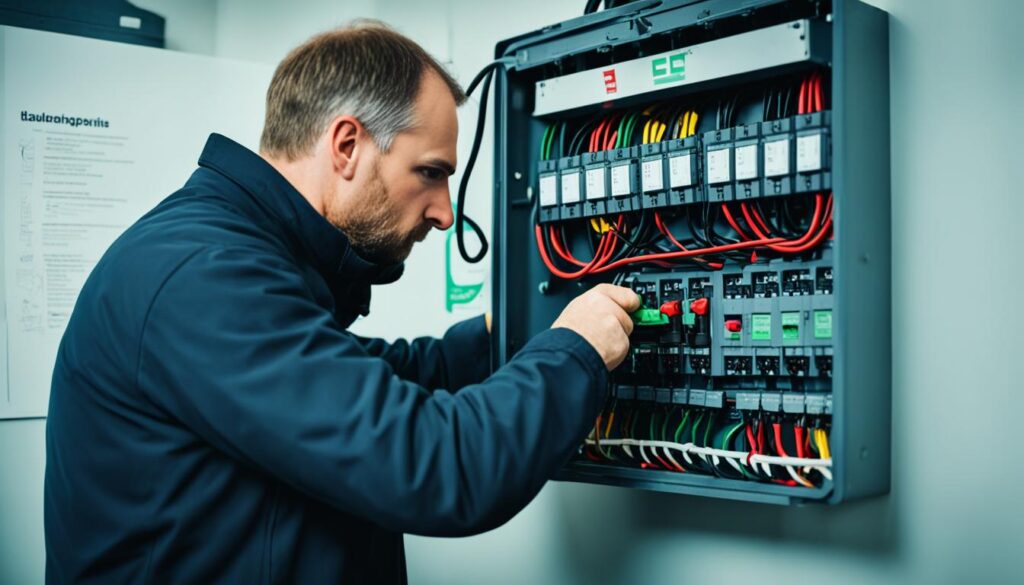
Considerations for Upgrading Your Fuse Box for EV Charging
When upgrading your fuse box for EV charging, it is important to consider regulations and safety requirements. Compliance with these standards ensures the installation is safe and reliable. To help you navigate this process, we have compiled a list of key considerations:
1. Regulations
Adhering to electrical regulations is essential when upgrading your fuse box for EV charging. Regulations ensure that the installation meets industry standards and minimizes safety risks. It is crucial to consult with a qualified electrician who is familiar with the latest regulations to ensure compliance.
2. Periodic Inspections
Regular inspections are crucial to maintain the safety and effectiveness of your fuse box. It is recommended to have a periodic inspection at least every 10 years, or more frequently if required by local regulations. These inspections help identify any potential issues and ensure that your fuse box is functioning properly.
3. Installation Testing
Proper testing of the fuse box installation is essential to ensure its reliability. This includes testing the circuit protective conductor (CPC) and earth wire to ensure they are functioning correctly and providing the required level of protection. An electrician can conduct thorough testing to verify that your fuse box installation meets the necessary standards.
4. Circuit Protective Conductor (CPC) and Earth Wire
The circuit protective conductor, commonly referred to as the CPC or earth wire, plays a critical role in ensuring electrical safety. The CPC provides a path for electrical fault currents to safely return to the earth, protecting against electric shocks and reducing the risk of fire. It is crucial to ensure that the CPC and earth wire are properly installed and connected.
“The circuit protective conductor is an essential component of the electrical system. It safeguards against electric shocks and helps maintain the overall safety of the installation.” – John Smith, Certified Electrician
Understanding the importance of the CPC and earth wire and their proper installation is crucial for a safe and reliable fuse box upgrade.
5. Consultation with a Qualified Electrician
When upgrading your fuse box, it is highly recommended to consult with a qualified electrician. They can provide expert advice, assess your specific requirements, and ensure that the installation meets all regulations and safety standards. A professional electrician will help you make informed decisions and ensure a seamless and safe upgrade process.
By carefully considering these factors when upgrading your fuse box for EV charging, you can ensure a safe, reliable, and compliant installation that supports your electric vehicle charging needs.
Planning the Upgrade for EV Charging
When planning the upgrade for EV charging, it is important to take into consideration the specific requirements of your electric vehicle. This will ensure that your charging setup is optimized for efficiency and convenience. Key factors to consider include charger installation, cable sizing, charging rate, and distance between your fuse box and the charging point.
Firstly, let’s discuss charger installation. Depending on the type and model of your electric vehicle, you may need to install a specific charging station or wall-mounted charger. It is crucial to consult with a qualified electrician to ensure that the installation is done safely and meets all relevant regulations.
Next, cable sizing is an important consideration. The cable connecting your charger to the fuse box should be sized appropriately to handle the required charging current. This may vary depending on the distance between the fuse box and the charging point. For longer distances, a thicker cable may be necessary to minimize power loss. Common cable sizes for EV charging include 6mm and 10mm.
The charging rate is another crucial aspect to consider. The charging rate determines how quickly your electric vehicle’s battery will be charged. A commonly used charging rate is 7kW, which provides a good balance between charging speed and cost-effectiveness. It is worth noting that higher charging rates may require additional electrical infrastructure upgrades, such as a three-phase power supply.
Incorporating Smart EVSEs (Electric Vehicle Supply Equipment) into your charging setup can provide several benefits. Smart EVSEs can manage the load on your main house fuse and prevent overloading, ensuring safe and efficient charging. These devices can also offer features such as scheduled charging and energy usage monitoring, giving you more control over your charging process.
Consulting with an electrician who specializes in EV charging installations is highly recommended. They will be able to assess your specific requirements and design an optimal setup that meets your charging needs while ensuring safety and compliance with regulations.
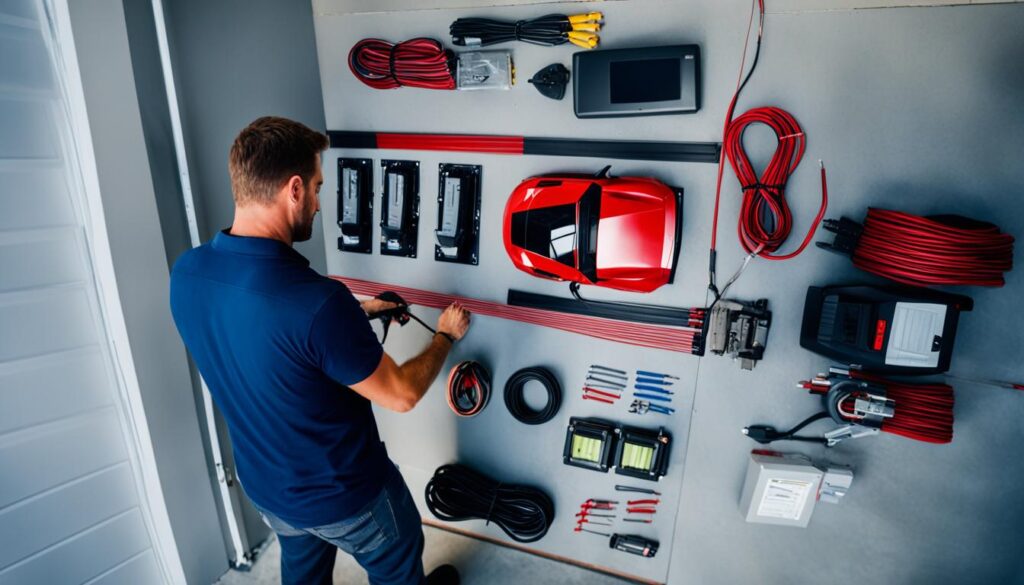
Now that you understand the key considerations for planning your EV charging upgrade, let’s summarize the important points:
| Planning Step | Considerations |
|---|---|
| Charger Installation | Consult with a qualified electrician to ensure proper installation and adherence to regulations. |
| Cable Sizing | Determine the appropriate cable size based on the distance between the fuse box and the charging point. |
| Charging Rate | Select a charging rate that balances speed and cost-effectiveness, keeping in mind any necessary electrical upgrades. |
| Smart EVSEs | Consider incorporating Smart EVSEs to manage load and provide additional functionality. |
By carefully planning your EV charging upgrade, you can ensure efficient and convenient charging for your electric vehicle, making the transition to electric mobility even smoother.
Engaging Professionals for Fuse Box Upgrades
When it comes to upgrading your fuse box, it is crucial to engage professionals who have the expertise and experience to ensure the work is done safely and correctly. Upgrading your meter tails and installing a DP isolation switch are tasks that require the knowledge of a qualified electrician, especially when it comes to working with EV charging installations.
Electricians who specialize in EV charging installations have the necessary skills to upgrade your meter tails, which are essential for delivering the required power to your charging point. They can also install a DP isolation switch, which allows you to safely disconnect the power supply to your EV charger when necessary.
In addition to meter tails upgrades and DP isolation switch installations, hiring a professional electrician can also provide assistance with the installation of a new consumer unit (CU). The CU is an important component of your electrical system that ensures the distribution of power throughout your home is safe and efficient.
Furthermore, professional electricians can carry out electrical safety testing to ensure that all the components of your fuse box and electrical system meet the necessary standards. Electrical safety testing involves inspecting the wiring, circuit breakers, and other components to identify any potential hazards or faults.
By engaging professionals for your fuse box upgrades, you can have peace of mind knowing that the work is being done to the highest standard. Professional electricians are trained to comply with regulations and follow best practices, ensuring the safety and efficiency of your electrical system.
Benefits of Engaging Professionals for Fuse Box Upgrades:
- Expertise in working with EV charging installations
- Safety and compliance with regulations
- Professional installation of meter tails and DP isolation switch
- Assistance with the installation of a new consumer unit
- Electrical safety testing to identify any potential hazards or faults
When it comes to the safety and performance of your electrical system, it is always best to leave the work to the professionals. Upgrading your fuse box for EV charging is a significant investment, and by engaging professional electricians, you can ensure that the work is done correctly, giving you peace of mind and confidence in your home’s electrical system.
| Benefits of Engaging Professionals for Fuse Box Upgrades |
|---|
| Expertise in working with EV charging installations |
| Safety and compliance with regulations |
| Professional installation of meter tails and DP isolation switch |
| Assistance with the installation of a new consumer unit |
| Electrical safety testing to identify any potential hazards or faults |
When upgrading your fuse box for EV charging, it is important to engage professionals who specialize in working with EV charging installations. They have the expertise to safely upgrade your meter tails and install a DP isolation switch, ensuring the proper delivery of power to your charging point. Professional electricians can also assist with the installation of a new consumer unit and carry out electrical safety testing to identify any potential hazards or faults. By hiring professionals, you can have peace of mind knowing that the work is being done to the highest standard, ensuring the safety and efficiency of your electrical system.
Conclusion
Upgrading your fuse box for electric car compatibility offers numerous benefits for both you and the environment. With an enhanced EV charging capability, you can charge your electric vehicle safely and efficiently, ensuring you never experience any power issues. By investing in this upgrade, you are not only preparing your home for the future of transportation but also contributing to the sustainability of the planet.
Having a fuse box that can handle the energy demands of EV charging is essential for a smooth and reliable charging experience. It eliminates the risk of overloads and ensures that your electric vehicle charges at its optimal rate. With a compatible fuse box, you can rest assured that your EV charging needs are met without compromising safety or efficiency.
Upgrading your fuse box also aligns with the UK’s green energy initiatives. By embracing sustainable transportation, you are actively participating in reducing carbon emissions and promoting a cleaner environment. Your contribution in supporting EV charging infrastructure is vital for the widespread adoption of electric vehicles, creating a greener and more sustainable future for everyone.
To enjoy the benefits of a fuse box upgrade and take a step towards sustainable transportation, it is recommended to consult with a qualified electrician. They can guide you through the process, assess your specific needs, and provide you with the best solution tailored to your requirements. Contact an electrician today to explore your options and embrace the advantages that come with upgrading your fuse box for electric car compatibility.





